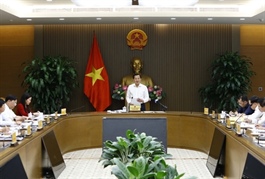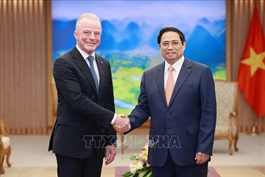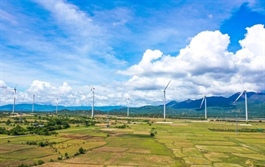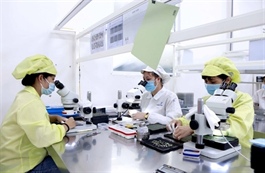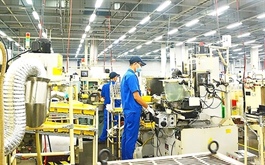Exports to Japan and South Korea fall short of potential: MoIT
Exports to Japan and South Korea fall short of potential: MoIT
Vietnamese businesses still have a lot to do to realise the full export potential to Japan and South Korea, according to the Ministry of Industry and Trade (MoIT).
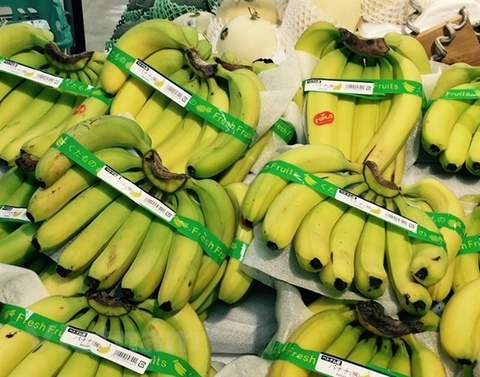
Vietnamese bananas on display at a supermarket in Japan. — VNA/VNS Photo Nguyen Tien |
In a recent report by the ministry, the Japanese market had a GDP of US$4.1 trillion in 2022 with a population of 125 million and an annual import demand of $900 million. South Korea's GDP was over $1.73 trillion, and an annual import demand of $731 million.
Despite numerous free trade agreements signed between Viet Nam and the two countries, Vietnamese products only accounted for a modest 2.7 per cent in the Japanese market and 3.3 per cent in the South Korean market. There was still a lot of room for improvement in Vietnamese exports, especially given the strong economic ties between the three countries in recent years.
Do Quoc Hung, deputy head of the Asia-Africa market department under the MoIT, said both Japan and South Korea have strong demand for products that are Viet Nam's strengths.
For example, Japan imports over $24 billion worth of textile products annually but Vietnamese exporters have only managed to account for just over 12 per cent market share. Viet Nam does better with leather and footwear products with 18 per cent market share, or $4.5 billion.
The Southeast Asian economy tends to do worse with agricultural products in Japan despite being a world-class exporter. Every year, Japan imported nearly $1 billion worth of bananas, mainly from the Philippines at $844 million. Meanwhile, Vietnamese banana accounts for just over $6 million.
Vietnamese coffee and seafood fare a little bit better at 14 per cent and 11-22 per cent market share, respectively.
It's the same story for South Korea where Vietnamese agricultural and seafood products exported to South Korea only account for about 3 per cent market share with bananas taking just 1.3 per cent and coffee 12 per cent in their respective markets.
Hung said the challenges no longer have to do with customs duties and trade barriers but rather a difficulty in meeting the high standards set by the two markets including quality, sustainability and environment.
In addition, Vietnamese exporters have yet to establish a strong connection with local distribution channels and lack the management capacity to oversee operations in foreign markets.
"We are sitting on major advantages thanks to numerous trade agreements signed with Japan in the form of reduced tariffs, in many cases to 0 per cent such as textile, garment and seafood," he said.
Similarly, a vast majority of Vietnamese products (97.2 per cent) exported to South Korea enjoy a 0 per cent tariff with Vietnamese fruits going to be tariff-free from 2024. Meanwhile, several ASEAN countries still face as high as 36 per cent tariffs in Japan and South Korea.
Consumer shift
A major reason was a shift in consumer's attitude towards more environmentally friendly and increased demand for highly specialised products in said markets.
Both countries have, in recent years, impose stricter standards on imported agricultural products. Those who cannot adapt will likely face great difficulty in gaining access in the future.
"Take banana for example, while there is great demand Japanese and South Korean consumers have specific preferences for varieties, packaging and weight," he said.
It requires a deep understanding of consumer behaviour and preference to produce the right products.
In addition, there have been numerous incidents in the last five years in which Vietnamese products were found to contain residue of harmful ingredients or additives.
According to Hung, due to the limited ability to meet quality standards, there have been numerous cases of violations of import standards. Statistics over the past 5 years have shown dozens of violations, mostly related to exceeding permissible levels of harmful ingredients or using unlicensed additives, which did not help improve Vietnamese products' reputation.
Vietnamese exporters have also been struggling with meeting product origin rules set by the two countries, which require exporters to be fully transparent when it comes to input material and product origin.
Experts have long called for greater incentive programmes for businesses to engage in more sustainable production and awareness of high-quality standards to help Vietnamese products compete in international markets including Japan and South Korea.








